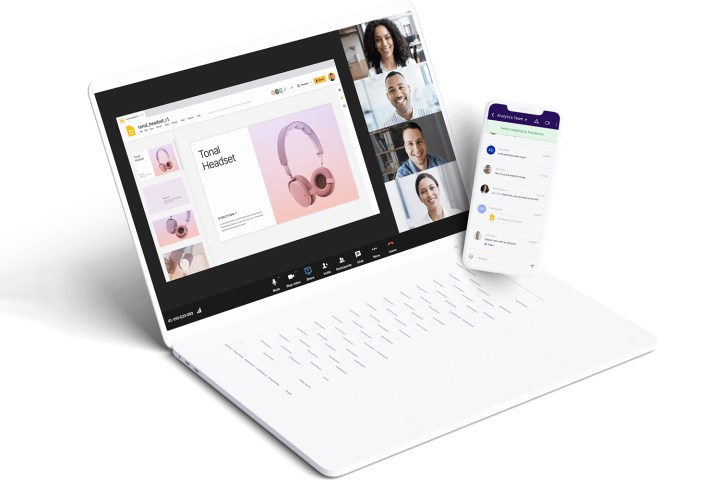Virtually every company does at least some of its business online nowadays, and if yours is among them, then you need a communications solution made for the digital age. The best way to streamline your communications is with a voice over internet protocol package, and if you’re looking for the best VoIP service, then look no further than RingCentral. Of course, you shouldn’t hand over your hard-earned cash without understanding what you’re paying for, but since VoIP can get pretty technical, we’ve put together a brief explainer on how RingCentral works and how it can help your business.
What is RingCentral?

RingCentral is a VoIP communications service. VoIP, short for “voice over internet protocol,” simply allows you to make phone calls over an internet connection rather than a traditional landline or cellular network. Since the internet was developed from telecommunications (most of us remember the days of old-school dial-up internet), VoIP isn’t exactly reinventing the wheel. However, VoIP providers like RingCentral offer a lot more than the simple ability to make phone calls using the internet; it’s much more comprehensive than that.
RingCentral is a complete all-in-one communications package for phone, text, team messaging, and more, and one that you can tailor to fit the size and needs of your business. You have several plans to choose from, each one with its own set of features and services (we’ll dive more into the different RingCentral plans and their pricing later). All of these packages offer unlimited voice calls, texts, team messaging, file sharing, and voicemail transcriptions. The higher plan levels add more advanced call handling functions and enterprise features.
Using a single, dedicated VoIP package like RingCentral is much better than having to use a bunch of different apps and services at once. By unifying your business communications (with your customers and clients as well as your colleagues and employees), you can streamline your operations, improve your workflow, and even reduce overhead if you’re currently over-paying for multiple subscription services. RingCentral is also objectively better than free software such as Skype or Zoom, which are fine for small-scale casual use but are lacking in advanced features and are not really built to handle the bandwidth that businesses need. That’s not to mention that these free apps are pretty much useless for handling incoming communications from your customers, as they’re not designed for that at all.
How does RingCentral work?
You should now have a general idea of what RingCentral is, but how does it actually work? As explained above, a VoIP service like RingCentral, at its most basic, is a way to do all of your communications over your existing local internet network. Combining your business calls, messaging, and other communications in this manner removes the need for a traditional landline while also offering a lot more utility than simple video calling and text messaging apps can provide. But there’s a little more to it than that.
After you choose the right RingCentral plan for your business, you’re ready to get started right away. RingCentral setup is straightforward and should take only minutes. If you ordered any equipment, such as VoIP phones, you’ll of course have to wait for those to arrive, but you can start using the RingCentral software immediately. The RingCentral app works with Windows and Mac computers as well as iOS and Android mobile devices. This gives you an interface for team messaging, file sharing, video calls, and so on, and for managing other features of your RingCentral plan, such as call analytics. You can also sync RingCentral with popular third-party workflow apps such as Microsoft Teams and Slack if you use them, as well as industry-specific platforms like Zendesk, Salesforce, and Canvas, among others. This is business-grade software, but note that some features are locked behind the upgraded package tiers — more on that later.
RingCentral is basically a cloud-based communications app that combines phone, text, voicemail, team communications, and document sharing on one platform, but it works with physical VoIP phones as well. VoIP phones are handsets that, at a glance, look (and operate) much like traditional landline phones. However, they integrate with your RingCentral plan to offer a bevy of other services including text messaging and video calls. These VoIP phones are useful for businesses that don’t want to do completely without traditional handsets, but you don’t need them, of course — you can use RingCentral entirely on computers and mobile devices and enjoy all the features that your subscription package provides.
Is RingCentral expensive?

RingCentral is one of the more cost-effective VoIP services in our opinion. The core RingCentral product is its Message, Video, and Phone (or MVP) plans. There are four MVP plan tiers: Essential, Standard, Premium, and Ultimate. Pricing for each tier varies depending on how many people will be on the plan as well as whether you pay monthly or annually — paying for the yearly subscription nets you the better rate, and the per-person price also decreases as the number of users scales up.
The most basic package is the Essentials plan, which can support up to 20 users and costs $20 per person per month if you pay annually ($30 per user for a monthly subscription). Aptly named, the Essentials tier offers all the standard VoIP functions like unlimited calling, text, team messaging, file sharing, and voicemail-to-text, but lacks more advanced call handling functions and third-party app integrations. The Standard plan supports unlimited users and adds features like video meetings, customer service analytics, workflow app integrations, and unlimited audio conferencing for $28 per user per month paid annually.
The $35/user/month Premium package — arguably the best value of the RingCentral MVP plans — includes all of that plus enhanced call handling functions, broader integration with third-party apps like Salesforce and Zendesk, and more advanced website development applications. The $50/user/month Ultimate plan has all of the features of the lower tiers along with device status reports and unlimited storage for recording calls, meetings, and other data. The prices quoted here are for annual subscriptions with less than 100 people; for businesses with more than 100 employees, the per-person price is $2 to $7 cheaper.
RingCentral does offer a free trial for its MVP plans, but in 2020, RingCentral rolled out a free video calling service in response to the COVID-19 pandemic and the sudden surge in people working and taking classes from home. RingCentral Video isn’t a VoIP package, but it offers video calls for up to 100 participants, unlimited meetings, file sharing, and team messaging. It can even integrate with popular work apps like Google Workspace, Microsoft Teams, and Microsoft 365, which is quite impressive for something that’s totally free.


